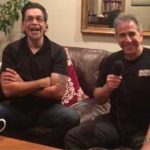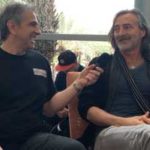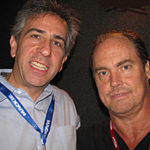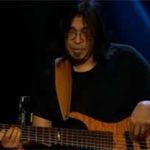The Led Zep mastermind reflects on the hammer of the gods
By Gary Graff
September 16, 2016
If there were a Mount Rushmore for guitar players, Jimmy Page’s would be one of the first faces carved into it. More than just the founder and guiding force of Led Zeppelin, the British virtuoso has a two-time Rock and Roll Hall of Fame-inducted resume that includes copious session work (for the Who, the Kinks, the Rolling Stones, Them and many more), membership in the Yardbirds and post-Zep endeavors such as The Firm (with Paul Rodgers), Coverdale Page and, again, more sessions for the likes of the Rolling Stones, Zep mate Robert Plant, Graham Nash, Stephen Stills and others.
Page has, in fact, been deeply immersed in his past during the past couple of years, curating new, deluxe editions of Zep’s catalog — including the just released The Complete BBC Sessions — as well as the “photographic memoir” Jimmy Page. But the past is just a pathway to the future, as Page revealed to us in our latest chat…
FGPO: First off, is it worth even asking how many guitars you own?
Page: Well, I don’t know really. I should know, but I can’t because I’ve got a lot of various instruments, a lot of string instruments that go from sitar to five-string banjos to mandolins to acoustic guitars, tabla drums blah de blah de blah. There’s about 120, 130 instruments, I think. That’s a lot, isn’t it? But I can tell you one thing: I haven’t got ’em all in my bedroom at once. Please do understand that.
FGPO: It’s been a busy stretch for you — all the Led Zeppelin album reissues, including the new Complete BBC Sessions — and your book, Jimmy Page. Has it felt like having your life flash before your eyes during the past couple of years?
Page: Well, it’s sort of multi-tasking, isn’t it. [laughs] In a way it is, isn’t it? Certainly with the book, it starts off there when I was about 12 or 13, but it goes through to, like 70, so you definitely see your life sort of flashing by, and you see the decades flashing by. But it’s alright. You see yourself growing up, really. It’s quite a joyous experience. I’m able to hear it all in a different context.
FGPO: Talk about those early days and getting turned on to making music.
Page: Y’know, I see these early photographs of the Beatles, and George Harrison has got his first guitar, which was my first electric guitar. He’s up north and I’m down in the south, so there must’ve been a few of them around, but not too many. And there I am probably doing what they were doing up there, which is try to emulate the music I heard coming from America in some shape or form and thinking I was Cliff Gallup or some of the early ones in rock ‘n’ roll, or rockabilly if you like, in the modes of what [Elvis] Presley was doing and inspiring so many people. Buddy Holly, Gene Vincent, all of them. And then accessing the blues and wanting just as much to be B.B. King as much as James Burton. It was this growth of this voracious appetite I had for all things six strings, really. I can see how it manifests across the board.
FGPO: Nowadays there’s so much information readily available it’s hard to have that kind of exploration and discovery anymore.
Page: Well, what’s interesting about my musical history is I was there in the early days when rock ‘n’ roll hit England and people were seduced by it and intoxicated by it, and then they took that music off the airwaves. But it was too late; everyone was captivated by it. I saw that changing style and what was going on in London, outside of London in the south, what was going on before the Beatles explosion and all that. I mean, I was there, you know? I know exactly how things came to be, about how the blues injection came on board with us, with that blues movement from Chicago, all of it. I call that really fascinating — and we haven’t even started. We’re just talking about something that’s pre-Beatles, do you know what I mean?
FGPO: So how did you channel all those influences into your own style?
Page: Because I had such eclectic tastes as a teenager, I was listening to classical music, I was listening to Indian music and African music as much as country blues. And I played a bit of [harmonica] as well; who didn’t want to sound like Little Walter, eh? All of these styles I was taking on board, so when I became a studio musician and started doing studio dates, I had quite extensive roots. My playing wasn’t just in one area; it was across the board. So it put me in good stead for being accepted into what was a very closed shop. I was seven years younger than anybody else who was playing there at the time, and I was accepted in — welcomed in, really. So that was really cool.
FGPO: What kind of impact did those days as a studio musician make on your playing?
Page: All of my roots, if you like, that didn’t change, but the days of being a studio musician were like an apprenticeship. I went in there not reading music; I could read chord charts. I came out of there reading music fluently, and I came out of there knowing things about recording techniques which I thought I didn’t know beforehand but I wanted to know about it. That’s how it was; it was sort of like a growing picture, really.
FGPO: A seminal moment of your career, it seems, was when Jeff Beck left the Yardbirds and you became lead guitarist. What’s your perspective on that development?
Page: That’s true. We came over [to America] when there were just four of us, when Jeff wasn’t in the band anymore and the whole of the guitar mantle was on my shoulders. I was really experimenting and trying this idea, that idea. We were playing all the underground circuit over here, all those venues, those magical names that we all know like the Grande Ballroom and the Fillmore, Winterland, all those places. I saw or witnessed the rise of underground radio on FM that was playing longer tracks than the AM singles market, and I knew that I wanted to make an album that would be suited to underground radio like that.
FGPO: Which became Little Games.
Page: That’s right. There was a producer involved, but I was really into sort of the production of things as well. And I knew what I wanted to do, so I was gonna be producer and do something that would showcase all of the musicians not just myself; although the first album would be a guitar tour de force, and I was doing acoustic guitars as much as electric at the time, it wasn’t going to be at the expense of anybody else, and that’s exactly how that first album was put together. And because we weren’t locked into a singles market we could keep developing and expanding what we had, the sort of combined talents of the band. And with the writing that went into it and the performances, it was going to just change pretty much everything from recording techniques to how songs were constructed and how riffs were done. It was just there to provide a first on everything.
FGPO: Take us back to that first time Led Zeppelin got in a room played together — actually as the New Yardbirds, of course. Did you know what you had immediately?
Page: As soon as we finished, we knew we had something. It was so very exciting. Everyone wanted to get on with it, just get into the playing and see what we could come up with. That’s the most rewarding aspect of things from my end of it; I played in what I believe was the best band that was ever going — the best rock ‘n’ roll band, for sure. At the end of the day, the music holds up and stands the test of time. It’s very warming to think that it touches people the way it still does.
FGPO: The latest Led Zeppelin reissues, including the BBC album, are filled with so many extras and bonus tracks. What was the experience like of diving into the vaults like that?
Page: Well, all of it was really good to review. It took hundreds of hours of listening. As a safety measure, I wasn’t going to do all this work and the project and find the other two guys weren’t behind it, so what I did was put together the Led Zeppelin III companion disc with all the various materials that are on that, all the different mixes and different versions, and also Presence, which I knew would be totally fresh to their ears. I played it to them individually and they were just knocked out with what was being done, and they said: “Yeah, go ahead.” And I did go ahead and listened to hundreds of hours of tape. It’s a lot of interesting things for people to hear.
FGPO: What are you up to now?
Page: I want to be putting together something whereby I will be going out and playing live. That’s an important thing. I’ve got new material, too. I’ve certainly got a past, and I would be able to play with just that material, too. So that’s something I want to do, really. I can’t tell you much. [laughs] One of the things that’s awful is, when you tell people you’re gonna do this, that and the other, is they’ve already worked out in their minds what exactly you’re going to do and then people present you with this whole package of: “Oh, are you working with this thing? Are you doing this? Are you doing that?” Let’s just say that I know what I’m going to do, without a shadow of a doubt. I’m going to be playing guitar — that’s absolutely, definitely.
FGPO: Has working on the archival material impacted on the new music in any way?
Page: Well, I’ve had new music together for quite awhile; I just haven’t committed it to any sort of recordings, because I didn’t want to date it. But I’ll date it and I’ll put a brand on it at the time that I do it. Then I’ll make a point of playing that live, and that’s about as far as the story goes on that.






